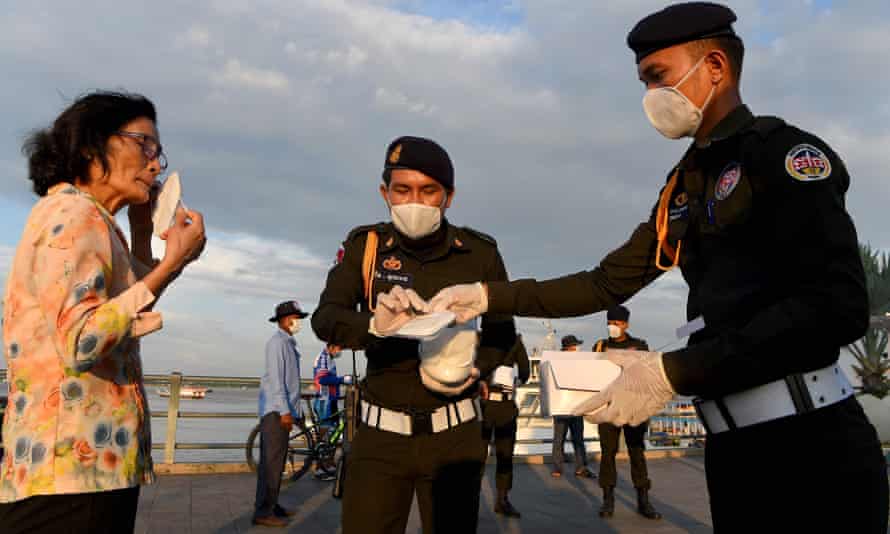
Last modified on Wed 16 Dec 2020 17.45 GMT
When the coronavirus first began to spread rapidly in the Chinese city of Wuhan, Thailand appeared especially vulnerable. It was the first country outside China to report a case of Covid-19, when, on 13 January, a 61-year-old woman from Wuhan was confirmed to have tested positive in Bangkok. Thailand was in its peak tourist season, welcoming travellers from around the world. A major outbreak seemed almost inevitable.
Yet, 11 months later, like many of its south-east Asian neighbours, Thailandhas so far avoided the worst of the virus.
As of 15 December, Thailand has recorded 4,246 infections since the start of the year – just over a fifth of the cases recorded on Monday alone in the UK. Fatalities stand at 60.
Prof Anucha Apisarnthanarak, chief of the infectious diseases division at Thammasat University, said the country's success was down to clear communication by health experts, a willingness to allow scientists to lead the response and an effective lockdown, which was followed by the public.
"I think one of the most impactful interventions was universal mask wearing," he added. "We did it not because we knew [it would be effective] but because somehow this is the Asian culture." There is, Anucha said, now evidence to suggest that this significantly lowered the number of infections and deaths.

As Thailand kept its case numbers under control, medical teams were able to offer greater care to patients who did test positive. Any person confirmed to have the virus was hospitalised, even if they were asymptomatic or had just mild symptoms – a policy that reduced the risk of further local transmission and of a patient becoming seriously ill.
'We are not immune'
Initially, just two laboratories in Thailand had capacity to test for Covid-19, but the number has since grown to 250, said Dr Supaporn Wacharapluesadee, deputy chief of the Thai Red Cross Emerging Infectious Diseases Health Science Centre at King Chulalongkorn memorial hospital. "We can have early detection of any suspected case," she said, with results provided within 24 hours, allowing early treatment. A WHO report on Thailand's response produced in July, stated that the case fatality rate was around 1.7%.
It is possible that demographics and the environment have also played a role. Obesity and other possible risk factors such as hypertension and diabetes are relatively less common in Thailand than in many of the countries worst hit by the coronavirus, said Anucha.
In neighbouring Cambodia – where confirmed national cases stand at 362 as of 15 December, and there have been no confirmed deaths – three-quarters of the population live in rural settings, and spend a great deal of time outdoors.
Neither countries' response has been flawless. Some have pointed to the low testing rates in Cambodia, and expressed particular concern over the vulnerability of prisoners in the country's notoriously cramped jails. Last month, the government identified what it described as the first community transmission, with the director of prisons, who had recent contact with inmates, testing positive.
A joint statement issued by Amnesty International, Human Rights Watch and the Cambodian League for the Promotion and Defense of Human Rights urged the government to conduct rigorous testing of prisoners, and to reduce overcrowding. Prisons department spokesperson Nuth Savna said last week that some inmates had slight fever, coughing and runny noses – symptoms he attributed to the changing weather, though they had not been tested at the time, according to a report by VOD English.
Cambodia's authoritarian leader, Hun Sen, a staunch ally of China, had previously caused alarm earlier by appearing to downplay the virus. Rights groups have accused him of using the virus as a pretext for cracking down on dissent and expanding his powers.

Hang Chansana, head of emergency health at the Cambodian Red Cross, said hospitals had not yet been overwhelmed – which would be the case if the country was facing a major outbreak. He put the country's success down to a strategy focused on three points: "One, promote control of the imported case; second, prevent spread in the community; and third, improve the treatment for the positive cases."
In both countries the pandemic has proved economically devastating. In Thailand, strict entry restrictions have halted tourism, contributing to millions of job losses. Over recent weeks, a small cluster of cases has emerged, linked to people travelling undetected over the Myanmar border, prompting fears the virus could spread among migrant workers, who may be reluctant to report symptoms if they have not crossed into the country through an official route.
Anyone entering Thailand is required to quarantine in designated facilities for 14 days, and undergo multiple Covid-19 tests.
The country will only be able to open up again once global cases are under control and a vaccine becomes available, said Anucha, which could be in May or June next year. He believes it is possible for Thailand to retain control of the virus – but only if it keeps up its guard.
"Our country really needs a vaccine," he added. "We are not immune."



Inga kommentarer:
Skicka en kommentar